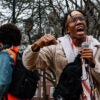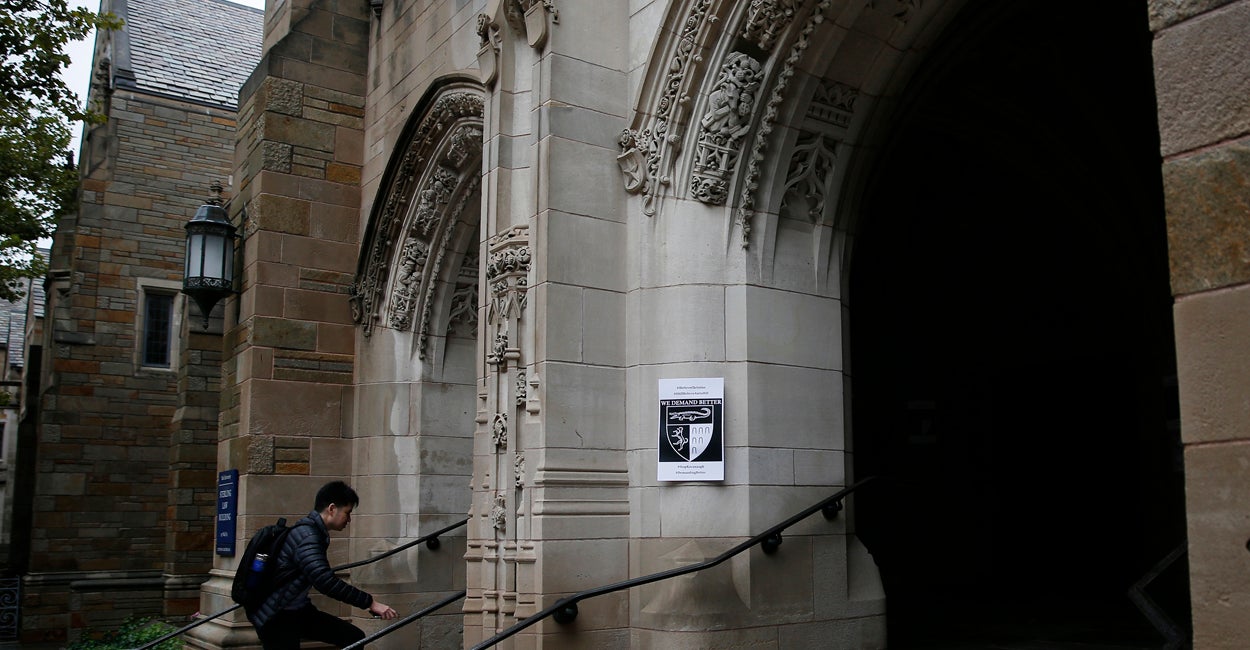Students at three recent college events threatened violence against conservative speakers, along with the student groups that invited them to speak on campus.
This may be commonplace today, but what makes this hostility so much more shocking is that it occurred at colleges once considered eminent law schools: Georgetown University Law Center, Hastings College of Law at the University of California, and Yale Law School.
These future lawyers and their professors have shown us precisely what they think of free speech and open inquiry when the wrong people with the wrong views come to campus.
The Daily Signal depends on the support of readers like you. Donate now
These identity politics-fueled attacks threaten to undermine legal education. As we have learned, nothing stays on campus anymore. Rank illiberalism in law schools will ripple through the profession and its institutions in due course.
At Georgetown University Law Center, Ilya Shapiro was put on administrative leave in January of this year, days before beginning his tenure as executive director of the Georgetown Center for the Constitution. The reason: Shapiro had tweeted that President Joe Biden’s nominee “will always have an asterisk attached” because the president promised to “only consider black women.”
Shapiro noted that Sri Srinivasan, who currently sits on the U.S. Court of Appeals for the District of Columbia Circuit, was the “best pick for Biden.” The “latest intersectionality hierarchy,” excluded this judge, he argued, and “so we’ll get [a] lesser black woman.”
Shapiro apologized for how the tweets were worded, and in isolation they read poorly. His argument buried behind this phrasing was obvious: We should not elevate candidates to the Supreme Court based on race and gender. Rather than contend with this claim, Georgetown Law suspended Shapiro for an insensitive tweet.
The call to terminate Shapiro has been publicly made by the Georgetown Black Law Students Association. Georgetown Law Dean William Treanor in a note to the law school community fabricated the wording of the tweets, stating that Shapiro had suggested “that the best Supreme Court nominee could not be a Black woman.”
Translation: This is a closed society, and Shapiro unartfully opened questions and debates that we will not have here.
That was a false characterization by Treanor, and it fanned the flames, leading to calls to action across campus. Treanor further stated that “Ilya Shapiro’s tweets are antithetical to the work that we do here every day to build inclusion, belonging, and respect for diversity.”
Students at Georgetown Law are learning how they should handle their disagreements with others. They should cancel them, suspend them, even fire them. Why not make arguments against his position, and teach your students how lawyers should behave?
Instead, the administration chose intolerance. Is it any wonder that some students have petitioned the school for a cry room so that they can grieve and process such manifest racism and bigotry?
Shapiro remains on administrative leave to this day.
Students from other campuses have taken their cues from Georgetown Law, including the Hastings School of Law, where Shapiro was recently shouted down at a debate with another professor about the nomination of Ketanji Brown Jackson.
Video of the event depicts near endless verbal assaults, yelling, and cursing. Members of the Black Law Student Association demanded that Shapiro be removed from campus. Shapiro at one point was directly impeded from approaching the lectern.
One student said, “We can’t have a bigot on campus.” Another exclaimed, “Remove him off the f—ing campus, because that’s what we want.”
Two professors explicitly affirmed the protests, their aims, and their methods. One of those professors, Rory Hastings, was set to debate Shapiro. And in the video of the event, he stated that he was for the protest.
Another professor, Veena Dubal, said on Twitter: “For me, the central intellectual query here is not whether Shapiro can speak, but why he was invited. Why is the voice of someone who has made overtly racist & misogynist statements being elevated?”
At least the Hastings administration affirmed free speech in an email sent to the law school community, but it did nothing against the students who broke the school’s policies with their thug tactics during Shapiro’s appearance. And that omission speaks loudly to students about what is favored and disfavored speech.
At Yale, an event with Kristen Waggoner, Alliance Defending Freedom general counsel, and Monica Miller with the American Humanist Association was interrupted in a physically intimidating and violent fashion by students. Video of the event evinces high-pitched sounds of shrieking voices. The police were called and were, apparently, needed.
Waggoner left campus in a police vehicle. Students who organized the event and the speakers both reported feeling unsafe and would not leave without security.
The student mob also pounded walls, blocked exits, yelled at speakers, and physically threatened Federalist Society students who organized the event.
This is more absurd, totalitarian behavior at a law school. We are talking about representatives from two organizations of remarkably different philosophies appearing together in general agreement about free speech.
What was so explosive about the event?
The event showcased the work both the Alliance Defending Freedom and the American Humanist Association performed together in the case Uzuegbunam v. Preczewski, in which the Supreme Court ruled that government officials can be held accountable for violating constitutionally protected freedoms.
A student was prevented from talking about the Gospel on his campus, and Alliance Defending Freedom represented the student and the American Humanist Association filed a “friend of the court” brief. So far, so good.
The ire of the students seems to have been triggered not by the actual work that Alliance Defending Freedom did in the case. Rather, their actions signal that Alliance Defending Freedom should not even be allowed to exist and participate in the legal system as a matter of right. The students screamed “protect the children” at one point.
Alliance Defending Freedom, among its many sins against the new morality, opposes the au courant indefinite extension of pronouns, an ideology that now demands even children should be introduced to it. For many students, that is the obverse of protecting students.
Protecting them now means to transgender them into the exciting malleable world of sexuality. Those who refuse this elastic notion of gender should not be allowed to speak because of the damage, hurt, and violence they psychically impose on students.
One way to become a better advocate is to listen to the other side, not shut it down. Waggoner, after all, has won at the Supreme Court, including the recent case she was at Yale to speak about to students. Her opponents might wonder what her secret sauce is. Those who are trying to launch their careers should have the humility to learn, to wonder.
But that is what these law students refused to do. The point is to crush opposing viewpoints.
And what did they learn from their supposed academic leadership on campus? No punishments of any kind were dealt to the students who verbally assaulted the speakers and the students. Yale Law School’s official statement was that the administration was “in serious conversation with students about our free speech policies, expectations, and norms.”
In other words, believe our lies. Mere words in a student handbook protect nothing if they are not enforced with official deeds. They are, at present, a dead letter.
Yale Law School denied that police were needed at the event, and the school’s official statement did not state that its free speech policy was violated. That prompted Waggoner to correct publicly this “blatant misrepresentation,” admonishing the leadership of the school that “ … Yale administrators shouldn’t be cowering to mobs. They should be insisting on embracing a culture of free speech.”
Much of the animus seems to be caused by the conservative and more classically liberal approaches certain speakers and groups take regarding identity politics and its vision for our politics and law to be defined by race and gender.
Moreover, the students seem to be taking cues from members of the administrations of their institutions. Those leaders have either led the attempt to quell speech they disfavor or they gently excuse censorious and physically aggressive behavior by their students.
This obviously should raise concerns about who our future jurists are and what type of legal culture they want to instantiate.
With Yale law students, we deal with future leaders in the profession. If blanket resistance to students or speakers who in any way question progressive pieties about identity politics becomes de rigueur and goes largely unpunished, then it would be an early sign that an official illiberalism will extend beyond campus and to our courts and politics.
Recognizing this nascent reality, U.S. Circuit Judge Laurence Silberman penned an email to the entire bench of federal judges noting the event and that those who participate in this kind of activity should be barred from federal clerkships. That was a positive first step.
The American law school follows an academic model of pedagogy, instruction, and rigor. According to this model, all relevant legal questions should be open and engaged, not closed by a vocal elect, self-proclaimed tribunes of race and gender. Yale’s students instead opted to bring the methods of a closed society to campus, preventing debate where it should flow freely if the academy is to remain true to its calling.
Legal academic training will always contain an adversarial approach, along with the inevitable human emotions and passions that must be restrained while making opposing arguments.
As befits the process of legal instruction, students must be inculcated with restraint, civility, and curiosity to form the mentality of a profession vital to a republican form of government built on the rule of law, in both civil and private law realms.
Such a legal system demands that its practitioners exercise an ethic of decency within a demanding, competitive profession.
Rule of law is about form, procedure, and process, if it’s about anything. But that demands discipline on the part of lawyers, judges, and other key actors.
The pedagogical process, one that initiates students into the world of lawyering and its demands for civility, must be defended by academics and deans of law schools. Here there can be no neutrality.
That we are having this conversation is another sign that identity politics—its thorough envelopment of many law school students and school administration members—always manifests itself in an authoritarian, illiberal style. Our constitutional order needs to develop antibodies quickly to ward it off.
Some could be forgiven for concluding that to protect it we need to defund law schools.
Have an opinion about this article? To sound off, please email letters@DailySignal.com and we’ll consider publishing your edited remarks in our regular “We Hear You” feature. Remember to include the URL or headline of the article plus your name and town and/or state.































